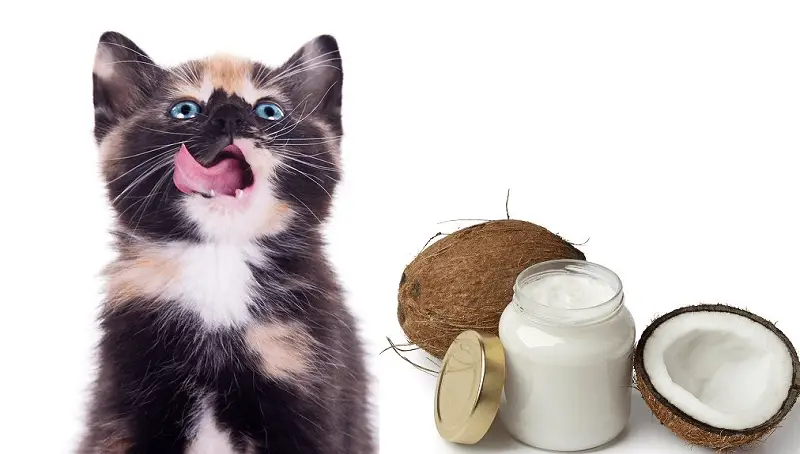
Foods That Are Toxic To Pet Birds
January 15, 2023
Betta Fish Lifespan
January 16, 2023
Coconut oil is gaining popularity among people, being used for things like cooking, hair care, and even as a moisturizer. But are there any benefits of coconut oil in cats? Is it a good idea to feed your cat coconut oil, and can you use it to protect its skin and fur?
The benefits of coconut oil in cats
Using coconut oil for cats can have many benefits.
Externally, coconut oil can help with allergies, dry skin, itching, and overall fur health.
Internally, coconut oil can bring multiple benefits:
- boosts the immune system of the cat;
- it can help fight the formation of hairballs in the cat’s stomach;
- may reduce inflammation of the joints (arthritis);
- it can improve bad breath;
- it can help maintain a healthy stomach.
Regular use of coconut oil is not recommended, but good results have been recorded in treating dermatitis.
Therefore, use coconut oil:
- on the cat’s skin, to treat itching, and dry skin, calm flea bites, to treat skin irritation;
- when bathing your pet, to get rid of the unpleasant odors of the fur and even fleas,
- on wounds and cuts to prevent infections, as coconut oil contains lauric acid, a well-known antimicrobial;
- to relieve constipation, but pay attention to dosage as too much oil causes diarrhea;
- to benefit from its antioxidant and anti-inflammatory properties, because it relieves arthritis pain, and normal thyroid function;
- to reduce inflammation and gum pain;
You might also like my articles about:
If your cat cannot tolerate traditional flea medications, coconut oil offers a safe alternative. Coconut oil can be applied to remove fleas in two ways: Trap and repel. The oil traps the fleas and makes them stick easily to the flea combs. For those who manage to escape, coconut oil contains a natural flea repellent called lauric acid to drive them away.
You can use coconut oil as an ointment on dry skin patches and insect bites to alleviate itching on your cat. As an additional effect, it moisturizes the affected skin. The usual infection behind dry skin and itching is a layer of dead skin. Coconut oil contains fatty acids that remove dead skin, allowing the formation of new healthy skin.
Coconut oil’s antioxidant properties soothe damaged skin. Its antibiotic and antifungal properties heal wounds caused by other conditions. It also moisturizes the coat itself, providing a glossy, smoother coat.
How to offer your cat coconut oil
 If you find that your cat enjoys coconut oil on her skin, they may also benefit from adding it to their diet as a supplement. Coconut oil contains medium-chain fatty acids that are easily absorbed into the digestive tract. Once in the digestive tract, these acids can alleviate constipation and irritable bowel symptoms.
If you find that your cat enjoys coconut oil on her skin, they may also benefit from adding it to their diet as a supplement. Coconut oil contains medium-chain fatty acids that are easily absorbed into the digestive tract. Once in the digestive tract, these acids can alleviate constipation and irritable bowel symptoms.
You can use small amounts of coconut oil along with your cat’s food, or apply it locally to cats with skin problems. But as with any new food or supplement, don’t give your cat too much coconut oil too early.
Coconut oil continues to work in the digestive system to balance the good and bad bacteria that are found in the body. With good amounts of vitamin E, vitamin K, and iron, coconut oil also contributes to a cat’s daily nutrition. Healthy digestion results in better absorption of nutrients from cat food. In fact, it can help some cats get a healthy weight.
Some cats tolerate coconut oil better than others, and some cats may be allergic to it. This happens less often, but it can happen. Too much can also cause diarrhea in your cat.
A medium-sized cat should receive 1/4-1/2 teaspoon 1-2 times/day maximum. Some veterinarians even recommend starting with 1/8 teaspoon per day at 20kg body weight. Cat owners who want to use coconut oil to treat hairballs may offer it less often, such as several times a week. Generally, start with a small amount and adjust as needed.
As for how to get your cat to eat coconut oil, this should not be a problem unless you have a particularly demanding cat. It can be administered directly because many cats like the taste. If your cat does not like to eat coconut oil, try mixing it with 1-2 teaspoons of canned cat food.
What are the risks of feeding your cat coconut oil?
While coconut oil has some benefits for cats, it’s important to note that it can cause stomach upset and diarrhea in cats.
Because it is high in saturated fats, it should be used with caution in cats with pancreatitis, and some cats may be sensitive to it. Therefore, the use of coconut oil in cats should be carefully monitored.
Coconut oil is also very high in calories, approx. 117 calories/spoon. You will need to reduce calories elsewhere in her diet to avoid unwanted weight gain if you start feeding your cat coconut oil.
Some cats may not respond well to coconut oil for various reasons. While allergy to coconut oil is unlikely, it is always possible. Starting with small amounts of oil and tracking rashes on her skin, it will tell you if your cat is allergic to it.
Alternatives to coconut oil in cats
If your cat does not tolerate coconut oil, there are alternatives to consider. Coconut oil appears to be used in a similar way to fish oil, although coconut oil does not contain the omega-3 fatty acids found in fish oil.
Applied on the skin, fish oil and olive oil can be good alternatives, although using them together would be ideal to maximize the fatty acids content. Olive oil can help with some skin problems, but it doesn’t have the same anti-inflammatory effects as coconut oil. Therefore, these oils are somewhat similar to coconut oil but do not have the same effects.
Final words!
All cats are different, and your veterinarian can help determine whether the benefits of using coconut oil for your cat overcome the risks. Always use 100% organic, unrefined coconut oil.
It is important to consider all aspects before treating our cats for any condition. Natural remedies are often safer. I hope you enjoyed this information about coconut oil in cats and that it will be useful in your particular case.
